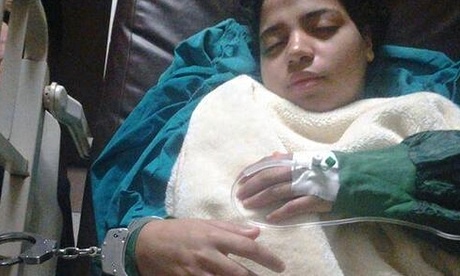
Dahab Hamdy handcuffed to a hospital bed. Photograph: Facebook
A 19-year-old woman has been released from detention after the birth of her child. Photographs of the new mother handcuffed to her hospital bed led to a public outcry.
Speaking at the family's home in the impoverished Cairo neighbourhood of Al Darb al-Ahmar after their release from Zeithoun hospital earlier this week, Ashraf Sayed, 34, said his wife, Dahab Hamdy, was still facing charges for her alleged involvement in an anti-regime protest.
He said the family feared that police would return to take his wife back to prison. "We are facing injustice," Sayed said. The couple have named their child Houreyya (Freedom).
Hamdy was arrested while heavily pregnant on 14 January – swept up in a crackdown on supporters of the banned Muslim Brotherhood during the first day of voting on Egypt's new constitution – when mass arrests took place in Cairo and other major cities throughout the country.
Hamdy said she was detained as she walked past a police station on her way to a doctor's appointment. Despite her repeated claims that she had not taken part in any protests, she was imprisoned at a police station and charged with violating the draconian protest law imposed in November.
Hamdy was sentenced to 15 days in detention, which was renewed three times pending investigations – a common practice used by Egyptian authorities to hold prisoners for extended periods of time.
In an interview broadcast on a Cairo-based news network before her release, Hamdy said a police officer told her following her arrest: "You will give birth in prison, just so you know."
Last Wednesday she was moved from her police cell to hospital, where her daughter – the couple's first child – was delivered the following day by caesarean section. Immediately after the delivery, Hamdy was once more restrained in her hospital bed.
A photograph of Hamdy, her right wrist handcuffed to the bed frame, spread quickly across social media sites.
Interior ministry officials ordered her early release after mounting criticism from human rights activists and lawyers about the state's treatment of the young woman. The step comes amid allegations of arbitrary arrests and the use of torture in prisons and police cells.
On Sunday, after confirmation that she would be freed, her lawyer asked that attention now turn to "all the other Dahabs" being held in Egyptian prisons and police stations.
Over the past two weeks, even state-owned media outlets have published accounts of brutal treatment of detainees by prison staff and police.
The reports mark an apparent shift in public opinion, and tolerance, for the unprecedented crackdown on any form of protest or criticism of the military-backed government.
Amnesty International has reported the routine beating of detainees, both men and women, as well as girls and boys, the denial of legal representation, and the holding and interrogation of those arrested in police camps, in violation of Egyptian and international laws.
More than 16,000 people are believed to have been arrested over the past six months following the overthrow of President Mohamed Morsi. Most are believed to be supporters of the Muslim Brotherhood.
In recently months, however, the state's targets for arrest have spread to secular, pro-democracy movements, including individuals who were prominent in the 2011 revolution that saw the removal of President Hosni Mubarak.

No comments:
Post a Comment